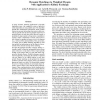Free Online Productivity Tools
i2Speak
i2Symbol
i2OCR
iTex2Img
iWeb2Print
iWeb2Shot
i2Type
iPdf2Split
iPdf2Merge
i2Bopomofo
i2Arabic
i2Style
i2Image
i2PDF
iLatex2Rtf
Sci2ools
108
Voted
AAAI
2012
2012
Dynamic Matching via Weighted Myopia with Application to Kidney Exchange
In many dynamic matching applications—especially high-stakes ones—the competitive ratios of prior-free online algorithms are unacceptably poor. The algorithm should take distributional information about possible futures into account in deciding what action to take now. This is typically done by drawing sample trajectories of possible futures at each time period, but may require a prohibitively large number of trajectories or prohibitive memory and/or computation to decide what action to take. Instead, we propose to learn potentials of elements (e.g., vertices) of the current problem. Then, at run time, we simply run an offline matching algorithm at each time period, but subtracting out in the objective the potentials of the elements used up in the matching. We apply the approach to kidney exchange. Kidney exchanges enable willing but incompatible patient-donor pairs (vertices) to swap donors. These swaps typically include cycles longer than two pairs and chains triggered by altru...
| Added | 29 Sep 2012 |
| Updated | 29 Sep 2012 |
| Type | Journal |
| Year | 2012 |
| Where | AAAI |
| Authors | John P. Dickerson, Ariel D. Procaccia, Tuomas Sandholm |
Comments (0)

